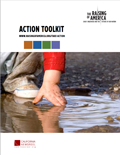TAKE ACTION
Menu

Menu
Inspiring Audiences to Action
1) Find success stories to spotlight
What success stories from your audience's own communities and from organizations like theirs will show that change is possible? Consider these suggestions – what kind of stories will your audience connect with?
Improving conditions directly related to early childhood
Increase social supports for families such as:
- child support payments
- paid parental, family and sick leave
- low-cost or free universal, high-quality child care and preschool
- home visiting programs
- increase the earned income credit
- quality schools
- safe places to play
Improving working conditions
- Decrease job strain
- Increase job autonomy and worker participation
- Provide flexible work hours to parents who need them while ensuring reliable work hours
- Encourage businesses to hire locally
- Strengthen and enforce occupational safety laws
- Guarantee paid sick leave, parental leave and paid holidays and vacations
- Ensure employees don’t feel ‘on-call’ after hours
- Provide time and private areas at work for new mothers to nurse and pump
Advancing living wages
- Raise the minimum wage to a level that can support a family
- Provide income, education and training for the under-skilled and unemployed
- Support collective bargaining rights
- Invest in needed infrastructure which improves communities while creating jobs
- Support the right to reliable work hours; ensure healthcare for all
- Restore a progressive income tax and inheritance taxes
- Constrain financial speculation; encourage worker-ownership
Improving schools
- Require smaller class sizes; equalize school spending
- Increase teacher pay, training, and prep time
- Reform educational policies based on high-stakes testing
- Create partnerships with families
- Keep facilities open in the evenings for community use
Improving social inclusion
- Decrease social inequality
- Struggle against discrimination and segregation
- Encourage democratic decision-making
- Strengthen participation in community organizations and local governance
- Promote the creation and use of public spaces
- Organize support groups for parents, including home visiting programs
Improving the physical environment
- Create more quality, low-cost housing
- Improve air quality and reduce exposure to toxins, especially lead and air particulates
- Create more parks and green spaces
- Promote farmers’ markets and fresh produce in local stores
- Ensure safe sidewalks and streets
- Provide reliable and low-cost public transit
- Encourage “green” development and pedestrian-oriented planning
Promoting racial justice
- Strengthen existing anti-discrimination laws and their enforcement
- Desegregate schools and equalize funding
- Build diverse neighborhoods
- Ensure that neighborhoods of color are well-served by transit, parks, fresh food markets and other resources
- Provide resources for jobs and educational access and retention
- End unequal enforcement of minor drug, traffic and other offenses
- Stop racial profiling and policy brutality
- Build awareness of implicit bias
- Use an equity lens to evaluate projects and initiatives, including development and transit
* Note: Promoting racial justice is intrinsic to all the efforts above.
2) Offer Concrete Ideas for Action
How will you translate the energy generated during your screening event into concrete action? For example, your participants can:
- Organize screenings within their own organization
- Identify programs and initiatives that can use the series as an educational tool
- Organize local screening events with PTAs, book clubs, neighborhood associations, churches, tenant groups, racial justice groups, trade unions, etc.
- Partner up with state and national organizations working on the key struggles for children and families in their neighborhoods
- Broker partnerships among child-focused organizations and organizations from other sectors (e.g., connect housing, education, employment, political orgs)
- Change the conversation through op-eds, letters to the editor, call-ins to radio shows, blog posts, etc.
- Organize a policy forum for government officials and civic leaders to learn about early childhood
- Sign up for your social media (newsletter, Facebook posts, Twitter feed, Instagram, etc.)
Whatever you choose, it is essential that you take into consideration the expertise and capacity of your audience so the actions are realistic and compelling to them.

ACTION TOOLKIT
- Eight Ways to Use the Series to Advance Your Work
- Six Elements of a New Conversation
- Planning a Successful Screening


